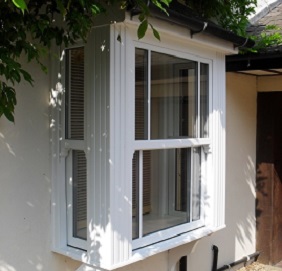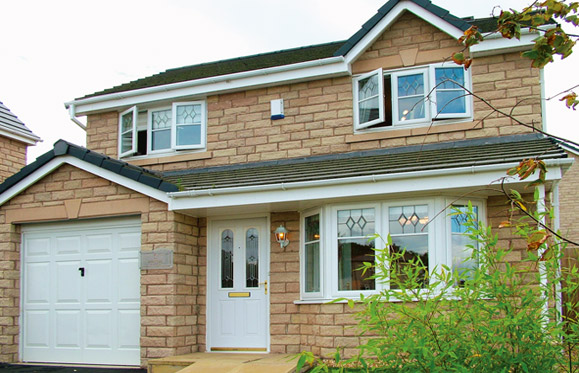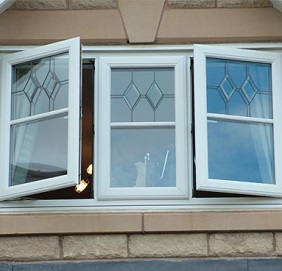UPVC windows and doors are the most popular home improvement products among homeowners across Lincolnshire. They’re durable, energy-efficient, and don’t need much looking after compared to wooden alternatives. But that doesn’t mean they’re completely maintenance-free. We’ve written this blog to help you keep your uPVC windows and doors in top condition for years to come.
At Cliffside Windows, we’ve been installing quality uPVC windows and doors for over 50 years, and we’ve picked up plenty of tips along the way. Even though uPVC is known for its low maintenance requirements, a bit of regular care will ensure they continue to work properly and look great.

Why Maintaining Your uPVC Windows and Doors Matters
You might wonder why maintenance is needed for your windows and doors. While it’s true that uPVC doesn’t require painting or treating like wood, proper care still matters for three key reasons.
Security
Windows and doors that aren’t maintained can develop problems with their locking mechanisms. Stiff hinges or build-up of dirt in locks can affect how well they close. This will compromise your home’s security.
Weatherproofing
Over time, seals can wear down, leading to draughts and water leaks. Regular checks mean you can spot and fix these issues before they cause damage to your home.
Energy Efficiency
One of the main reasons people choose uPVC double glazing is to cut energy bills. But seals or frames that don’t close properly can reduce energy efficiency. Keeping your windows and doors in good condition helps maintain their insulating properties.
Draughts can make homes difficult to heat, forcing your central heating to work overly hard and raising your energy bills.

Cleaning Your uPVC Windows and Doors
Basic Cleaning
For regular cleaning of uPVC window frames and doors:
- Start with warm, soapy water and a soft cloth
- Wipe down frames to remove dust and light dirt
- For best results, use a mild detergent if needed
- Rinse with clean water using a damp cloth
- Dry thoroughly to prevent water marks
The best cleaning method is usually the simplest one. You don’t need fancy cleaning products for day-to-day maintenance.
Dealing with Stubborn Dirt
Sometimes, everyday cleaning isn’t enough, especially if dirt has built up over time. Here are a few safe ways to tackle tougher marks on uPVC.
- Avoid harsh products: Steer clear of abrasive cleaners or scourers, as these can scratch the surface.
- Reach tricky corners: An old paintbrush is a handy tool for loosening grime in hard-to-reach areas.
- Brighten discoloured frames: If white uPVC has started to look dull, a specialist uPVC cleaner may help restore its appearance. Never use bleach, as it can cause permanent staining.
- Remove stubborn marks: For particularly tough spots, try applying a little WD-40 to a soft cloth. Always test on a hidden area first to make sure it doesn’t affect the finish.
Inspecting Your Windows and Doors
Regular maintenance isn’t just about cleaning. Taking the time to inspect your windows and doors can help you spot small issues before they turn into bigger, more expensive problems. A quick check every six months is usually enough to keep everything in good working order, and it only takes a few minutes to run through the key points below.
- Check all seals around the windows and doors for signs of wear or damage
- Look for condensation between panes, which might indicate a failed seal
- Check for smooth opening and closing of all windows and doors
- Inspect drainage holes at the bottom of window frames and clear any blockages
- Look for any signs of moisture or water damage around the frames
Preserving Your uPVC Windows and Doors
Looking after your windows and doors doesn’t need to be complicated. By following a few straightforward steps, you can help protect their appearance. These simple steps will help maintain functionality and appearance:
Caring for Hardware
- Clean handles and hinges to remove built-up dirt
- Apply a suitable lubricant to stiff hinges and moving parts (a silicone spray works well)
- Tighten any loose screws in handles or hinges
- Never use WD-40 or other solvents on locks, as they can damage the internal mechanisms
Preventing Problems
- Ensure good ventilation in your home to reduce condensation
- Use extractor fans in kitchens and bathrooms to control moisture
- Open windows regularly to air your home
- Wipe away condensation from windows when it forms
What to Avoid
- Don’t use abrasive cleaners or scouring pads
- Avoid solvent-based cleaners on coloured uPVC as they can affect the colour
- Never paint uPVC frames
- Don’t force windows or doors that are sticking
Why Choose Cliffside Windows
We are a family-run business serving Lincolnshire for over five decades. We provide quality uPVC windows, doors, and conservatories that are built to last.
Our windows are designed with excellent insulation properties and security features. When you choose our products, you’re getting decades of experience and craftsmanship, backed by our comprehensive guarantees.

Need a Hand? We’re Here
With these simple maintenance tips, your uPVC windows and doors should stay looking good and working well for many years. Regular cleaning and occasional checks of seals, locks, and moving parts will keep them in top condition.
If you notice any issues you can’t resolve with basic maintenance, or if you’re thinking about replacing your windows and doors with new ones, we’re here to help. Our team can offer advice on repairs or guide you through the options for home improvement.
For more information about our uPVC windows and doors, you can call us on 01526 320534, email us at enquiries@cliffsidewindows.co.uk, or use our online contact form.
Frequently Asked Questions
How often should I clean my uPVC windows and doors?
For most homes, cleaning frames with warm soapy water every 3-4 months is enough. If you live near a busy road or in a coastal area, you might need to clean them more often due to extra dirt or salt in the air.
Why is there condensation on my windows?
Condensation on the outside of your windows is usually caused by moisture in your home’s air meeting the cold glass surface and is quite normal. Condensation between the panes of double glazing suggests the seal has failed, and the unit will likely need replacing.
My uPVC windows are difficult to open and close. What should I do?
First, check for and remove any dirt in the tracks. Then apply a silicone-based lubricant to the hinges and moving parts. If this doesn’t help, the problem might be with the alignment or hardware, and you might need professional assistance.
More From Us
Key Signs for When to Replace Windows and Doors


